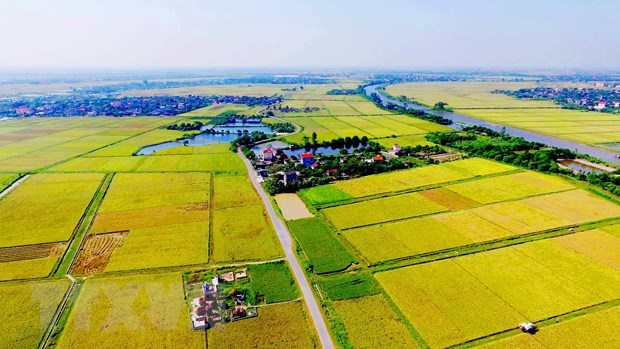 Society
Society


|
| Rice field in Ninh Thành Commune, Ninh Giang District, Hải Dương Province. — VNA/VNS Photo |
HÀ NỘI — A failure to improve the agricultural land market has discouraged the private sector to invest in the sector, experts have said.
The Institute for Policy and Strategy of Agricultural and Rural Development (IPSARD)'s vice chairman Hoàng Vũ Quang said the prevailing problem with the country’s agriculture sector was that farmers often owned small land lots instead of large-scale fields.
Speaking at a workshop on measures to develop the agricultural land market last week in Hà Nội, Quang said up to 89 per cent of Vietnamese farmers had less than 2ha of arable land, of which 63 per cent owned less than 0.5ha.
The Government had recently attempted to adjust its land policy towards allowing large-scale land accumulation to help create concentrated production areas and attract the private sector to invest in agriculture, he said, but things “did not work out as expected”.
“We can only increase our competitiveness once we address the land accumulation puzzle,” Quang said.
But according to Nguyễn Văn Tốn from the Central Economics Committee’s Department of Agriculture, Việt Nam’s farmland market was still young and lacked much-needed transparency to attract investors.
“Some administrative regulations are not in favour of promoting the agricultural land market,” he said.
The Việt Nam Chamber of Commerce and Industry’s Department of Legal Affairs head Đậu Anh Tuấn told the workshop that up to 31 per cent of agricultural businesses in a survey said that paperwork was the biggest challenge for them.
Nguyễn Trung Kiên from IPSARD said that the Government could consider learning lessons from Japan and China to develop the farmland market.
Japan, for example, set up the Farmland Intermediary Administration Organisation (FIAO) in 2014. It mainly acts as a middle-man, renting land from farmers and redistricting small farms to form larger plots and lend to the large-scale farms and enterprises.
“The Government’s role in that organisation is crucial. The Japanese government supports the FIAO by a range of policies like levying a high tax on abandoned land, revoking unclaimed lots and offering financial aid for commercial farms and firms to rent the land,” he said.
China, meanwhile, established the first Land Transfer Service Centre (LTSC) in 2010 to acquire land and provide information on the demand and supply of the rental land market, Kiên said. The Chinese government guarantees preferential loans for big farms and businesses to rent land or to build irrigation infrastructure and other facilities.
“(The Government should) create a smooth legal corridor for the agricultural land market. The Government should also have support policies in terms of credit or labour. Apart from that, it should build an effective and transparent land management system,” Quang said. — VNS




